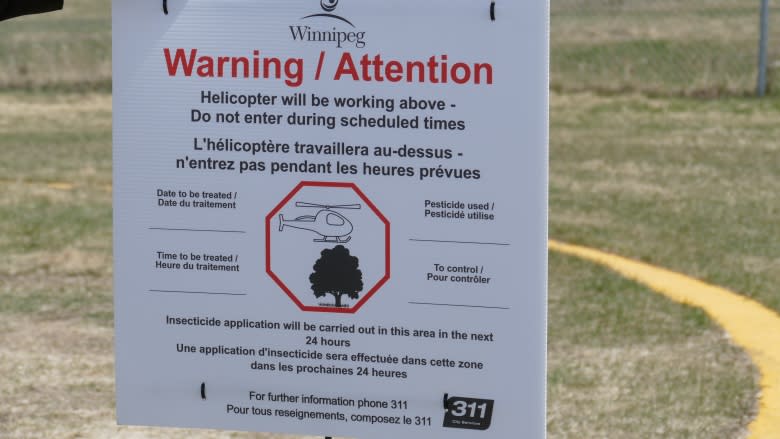Look, overhead: New signs will warn of mosquito larvae-killing choppers
If you're out walking in a soggy area of Winnipeg this month, you may come across new signs with warnings about helicopters flying overhead.
Transport Canada now requires the city to warn residents before insect control branch helicopters apply larvicide to fields covered in standing water as part of the annual effort to reduce mosquito-larvae populations.
The signs will be placed 24 hours before larviciding flights at athletic fields, larger parks and golf courses and other areas where people may go, insect control branch superintendent Ken Nawolsky said.
City staff will prevent people from entering areas subject to larviciding 20 minutes before the flights, he said.
The precaution is because of the remote possibility of helicopter crashes and not because of any safety issues presented by potential contact with the biological agents the city uses to kill mosquito larvae.
The new procedures will add $135,000 to the cost of insect-control operations this year, Nawolsky said.
No city helicopter has crashed in the 23 years since helicopters began applying larvicides to standing water in Winnipeg, he said.
Larviciding flights began on Monday, while ground crews began applying larvicide to easily accessible bodies of standing water on April 27, he said.
The city is monitoring 31,500 acres of standing water this spring, which is above average for a typical year.
Mosquito-larvae development has been slow and no significant emergence of adult mosquitoes is expected until June, Nawolsky said.
The city has also started counting nuisance mosquitoes for the season. Daily trap counts will start appearing on the city's website on Wednesday.
In the event of a large emergence of adult nuisance mosquitoes, the city plans to fog with a pesticide containing deltamethrin, a chemical replacement for the malathion the city used as a fogging agent for decades.
The city is still awaiting Health Canada approval to use deltamethrin. That's expected before June 8, Nawolsky said.



